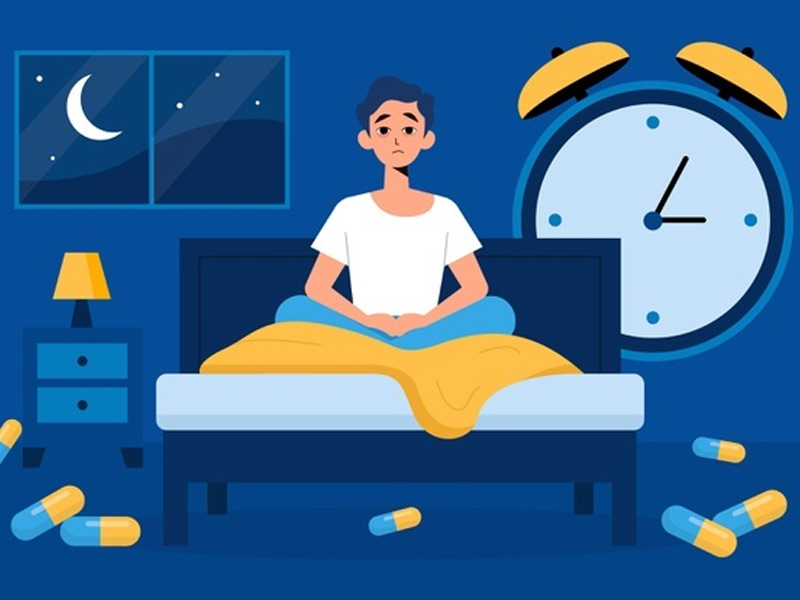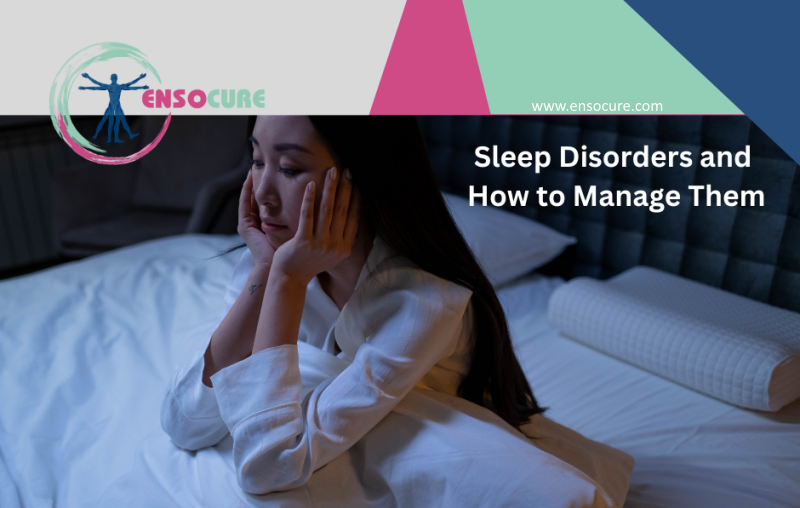Sleep disorders today have become an increasingly prevalent concern disrupting the lives of many. The demands of modern life, digital connectivity, demanding work schedules, and constant exposure to screens have significantly impacted our sleep patterns to the point of affecting general health. Several studies in India have found that 15% to 28% of the studied population suffered from various sleep disorders, with hypertension being a common issue among them.

One cross-sectional study in 2015 carried out among OPD patients at St. Philomena’s Hospital, Bengaluru, found 33% of participants had chronic insomnia. Worldwide, almost 30% of the population suffers from various sleep disorders, with more than 50 million people affected in the US alone.
What Are Sleep Disorders?
Sleep plays an essential role in the physiological health and regulation of the CNS (central nervous system). It impacts your metabolism, catabolism, body temperature and cognitive function. Sleep disorders affect your sleep quality, duration, and ability to function while awake. Such conditions can severely affect your mental health increasing the risk of cognitive issues such as anxiety, stress, and depression. Some sleep disorders may also be symptoms of underlying health issues, hormonal imbalance, and mental health conditions. The link between sleep disorders and poor mental health is a common and essential lifestyle issue that needs immediate redressal and rectification in the early stages.
How a Modern lifestyle Impacts sleep
Advancing technology has brought about tremendous convenience in life, but it has also given rise to health problems due to its excessive use. Exposure to blue light from screens, such as smartphones, tablets, and computers, can negatively impact sleep more than you can imagine.
Studies have found that smartphone screens can suppress melatonin production, a hormone that regulates sleep. Furthermore, the constant availability of information and communication through these devices can lead to hyperarousal, making it difficult for our minds to unwind and prepare for restful sleep. Besides technology, work stress and the pressure to meet deadlines also contribute to inadequate sleep.
Types Of Sleep Disorders Common in Modern Life
Today more than 80 sleep disorders exist, and while there are methods to categorize them based on symptoms, causes and effects, most sleep disorders are characterized by four signs.
- Difficulty in falling or remaining asleep
- Sleepiness during the day
- Circadian imbalances interfering with a sleep routine
- Displaying unusual behaviours that disrupt sleep
The International Classification of Sleep Disorders (ICSD), the gold standard for diagnosing sleep disorders, has updated the categories of sleep disorder based on the symptoms, how it affects a person (pathophysiology) and the body system it affects. The six types are:
- Insomnia Disorders
- Sleep-Related Breathing Disorders
- Central Disorders of Hypersomnolence
- Circadian Rhythm Sleep-Wake Disorders
- Parasomnias
- Sleep-Related Movement Disorders
Common Sleep Disorders in Modern Life
Insomnia
Insomnia is one of the most prevalent sleep disorders in modern society. Characterized by difficulty in falling asleep, staying asleep, or waking up too early and not being able to fall back asleep, it can be triggered by stress, anxiety, or poor sleep habits. The 24/7 nature of our lives and the tendency to bring work and worries into the bedroom contribute a lot to insomnia.
There are various types of insomnia, such as:
- Short-term insomnia
- Chronic insomnia
- Sleep onset insomnia
- Early awakening insomnia
- Sleep Maintenance Insomnia
- Comorbid Insomnia
- Mixed insomnia
Sleep Apnea
Sleep apnea involves excessive snoring causing interruptions in breathing during sleep resulting in waking up several times at night. You might wake up sometimes gasping for air with the feeling of choking. Sleep apnea can result from factors such as obesity, alcohol consumption, and even genetics. There are two types of sleep apnea
- Obstructive sleep apnea: Occurs due to a partial or complete collapse of your airways, reducing oxygen intake and abrupt awakening.
- Central sleep apnea: Occurs when your brain temporarily stops signaling your throat muscles to breathe, resulting in abrupt awakening.
Narcolepsy
A sleep disorder characterized by excessive daytime tiredness despite getting enough sleep at night. Narcolepsy results in “sleep attacks” lasting for a short duration, or maybe a few minutes. It is a neurological disorder resulting in the brain’s inability to control the sleep-wake cycle. A narcolepsy diagnosis depends on several factors and can be assessed by a doctor. The most probable causes of narcolepsy are genetics, stress, hormonal imbalances, infection, and a lack of the brain chemical hypocretin (also known as orexin), which regulates wakefulness. Part of narcolepsy treatment is practicing good sleeping habits.
Restless Legs Syndrome (RLS)
Restless leg syndrome, also known as Willis-Ekbom disease, is a neurological disorder that triggers an irresistible urge to move the legs. The constant use of screens and prolonged periods of sitting, or lying down, typical in modern life, worsen the symptoms of RLS further. Research has found how RLS is linked to pregnancy, iron deficiency, excessive caffeine, alcohol and nicotine intake, neuropathy, and Parkinson’s disease. RLS has no cure, but treatment involves efficient management to reduce symptoms.
Parasomnias
Parasomnias are a sub-category of sleep disorders involving unusual behaviour during sleep, such as movements, emotions, perceptions, and dreams that occur during different stages of sleep. They can highly disrupt the sleep process and occur on fleeting occasions or often in life. The different types of parasomnias include:
- Non-REM parasomnia: Sleepwalking, sleep-related eating disorder, confusion arousals, sleep bruxism, and night terrors.
- REM parasomnias: Sleep paralysis, nightmares, vivid dreaming.
The complete cause of parasomnias is still under research as the experts do not entirely understand it. However, the most probable causes are cognitive dysfunction, stress, depression, and anxiety. CBT (cognitive behavioural therapy), and healthy sleep habits can reduce parasomnia symptoms.
What Causes Sleep Disorders?
Sleep disorders can be caused by several factors involving a combination of biological, psychological, and environmental reasons. Research has narrowed down the list of causes of sleep disorders to the following.
• Genetics
• Medical Conditions
• Mental Health Disorders
• Neurological Disorders
• Hormonal imbalances
• Stress and Anxiety:
• Poor Lifestyle Factors
• Shift Work and Jet Lag
• Medications
• Substance Abuse
• Environmental Factors
• Age
• Weight and Diet
Managing Sleep Disorders in the Modern World
Maintain a consistent sleep schedule: A regular sleep-wake cycle helps regulate your body’s internal clock. It would help if you tried to sleep and wake up simultaneously every day, even on weekends. Staying committed to this routine will reinforce your body’s natural sleep patterns.
Create a sleep-friendly environment: Make your bedroom a sleep sanctuary by keeping it dark, calm, and quiet. It should also be kept cool because room temperature can affect sleep. Use blackout curtains to block out external light and use white noise machines to mask disruptive sounds.
Limit Screen Time Before Bed: Research has established how the blue light emitted from smartphones and tabs can negatively impact melatonin production. It’s best not to use your smartphone an hour before sleep; read a book, meditate, take a warm bath, or listen to music.
Be Mindful and Relax: Techniques like deep breathing, yoga, sleep exercises, meditation, and progressive muscle relaxation can help calm your mind and prepare it for sleep. Practicing mindfulness reduces stress and anxiety, common triggers for sleep disorders.
Exercise: Regular physical activity can improve sleep. However, exercising too close to bedtime might be counterproductive and stimulate your body to stay alert and awake. Make sure your exercise routine finishes a few hours before bedtime.
Reduce Caffeine and Alcohol: It is a no-brainer that coffee keeps you awake, so avoiding drinking it in the evenings is best. Alcohol makes you feel drowsy, but it can disrupt your sleep cycle and lead to fragmented sleep.
Sleep disorders can impact your quality of life. The best approach is to recognize and identify the specific cause of your sleep disorder best diagnosed by a professional or sleep specialist. An accurate diagnosis and treatment will address the probable causes and underlying issues to improve your sleep. Adopting good sleep hygiene and making positive changes to your lifestyle can also help overcome your sleep disorders for restorative sleep and well-being.

